- I changed 8 settings on my Motorola phone for an instant battery boost
- Your car's USB port is more useful than you think. 5 features you're missing out on
- Anubis Ransomware Adds File-Wiping Capability
- Liderar en la era de los algoritmos: un desafío para el CIO actual
- Understanding how data fabric enhances data security and governance
PIA vs ExpressVPN (2024): Which VPN Is Better?
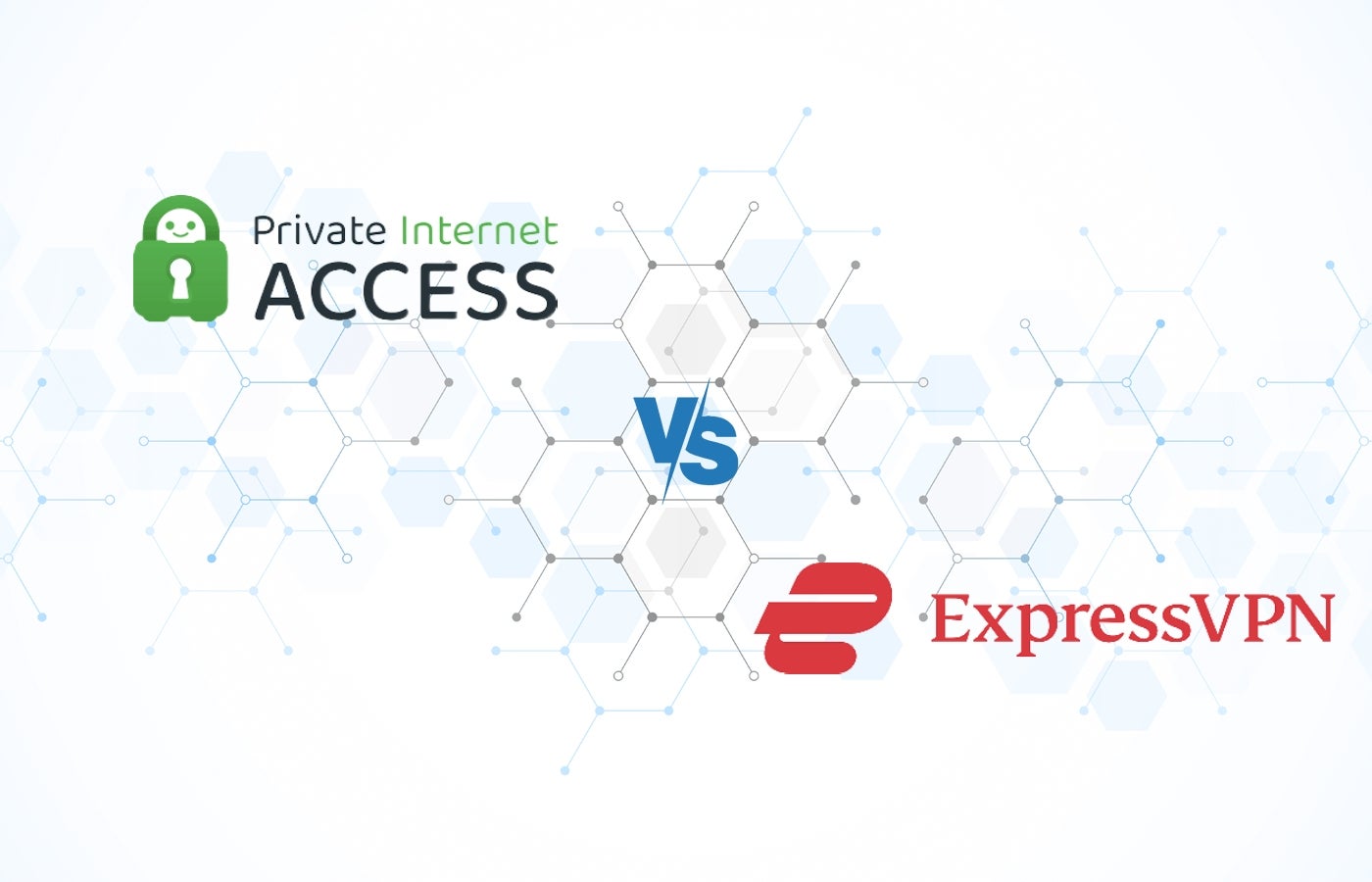
Private Internet Access VPN and ExpressVPN are two of the fastest-performing VPNs I’ve tested so far. With both options providing top-tier VPN speeds, it may be hard to choose which solution you and your business should go for.
Fortunately, both VPN services have their own unique selling points that differentiate them from one another. On one hand, PIA VPN presents really good value with its affordable paid subscriptions and multiple device connections. On the other hand, ExpressVPN prioritizes offering a smooth and reliable user experience — albeit for a higher price tag.
In this article, we take a look at which VPN is best for you and your organization.
- Private Internet Access: Best for startups and budget-conscious users that want fast VPN speeds and unlimited device connections at an affordable price.
- ExpressVPN: Best for small-to-medium sized businesses looking for a well-designed and user-friendly VPN application while offering fast and reliable speeds.
Private Internet Access VPN vs ExpressVPN: Comparison
| Our rating | ||
| Security protocols | ||
| No. of servers | ||
| VPN server locations | ||
| Simultaneous device locations | ||
| Supported platforms | ||
| Free trial | ||
| Starting price (annual) | ||
|
|
Private Internet Access VPN vs ExpressVPN: Pricing
Both PIA VPN and ExpressVPN offer three subscription tiers that vary depending on the contract length. Personally, I like this approach as it simplifies the buying process compared to other VPNs that categorize their plans depending on the number of features included in a particular tier.
Private Internet Access VPN pricing
PIA VPN comes with three plans: a one-month, an annual and a three-year subscription. All three subscription plans provide the same functionality, with the only difference being the final contract length.
- 1 month: $11.95 per month.
- 1 year: $3.33 per month.
- 3 years: $2.03 per month.
Unfortunately, PIA VPN doesn’t have a free version. However, it does offer a free trial via its mobile application. Thankfully, you can use PIA VPN on desktop after accessing the free trial either through Android or iOS. I’m also happy to report that this trial doesn’t require any payment or credit card information to access.
If you want to learn more, read our full Private Internet Access VPN review.
ExpressVPN pricing
ExpressVPN has three plans: a monthly, a six-month and an annual subscription. Like PIA VPN, all three plan options provide the same feature set.
- 1 month: $12.95 per month.
- 6 months: $9.99 per month.
- 1 year: $8.32 per month.
ExpressVPN currently doesn’t offer a dedicated free version. What it does offer is a similar seven-day free trial that’s accessible through its Android or iOS mobile application. One key difference compared to PIA’s trial, however, is that ExpressVPN’s free trial requires payment information to access.
SEE: NordVPN vs ExpressVPN: Which VPN Is Best? (TechRepublic)
To be clear, the trial is free and ExpressVPN won’t charge you until after the seven-day period. But if you want a free trial that doesn’t require handing over any payment information, PIA VPN is the better option.
If you want to learn more, read our full ExpressVPN review.
Private Internet Access VPN vs ExpressVPN: Feature comparison
Security protocols and encryption
Winner: Tie
In terms of security protocols and encryption, PIA VPN and ExpressVPN both score a point. Both PIA VPN and ExpressVPN carry security protocols built both for security and speed.
PIA VPN lets users choose between OpenVPN and WireGuard, while ExpressVPN comes with OpenVPN and its proprietary Lightway protocol. According to ExpressVPN, Lightway is designed to provide a speedy and secure VPN experience.
I personally think having OpenVPN for security and either WireGuard or Lightway for speed is a great balance in a modern-day VPN. I’m glad PIA and ExpressVPN didn’t skimp in this aspect.
SEE: How to Start a Career in Cybersecurity (TechRepublic Premium)
We get the same story in the encryption department, with both PIA VPN and ExpressVPN utilizing the military-grade AES-256 encryption algorithm.
In 2024, I almost consider having AES encryption a requirement since it’s widely recognized as one of the most uncrackable encryption algorithms today. So much so that it’s used by the likes of the United States government and banking institutions to keep their data safe.
VPN server network and locations
Winner: ExpressVPN
Looking into both VPN’s respective server networks, I have to give the win to ExpressVPN for its more diverse location spread compared to PIA VPN. As of July 2024, ExpressVPN’s server network includes servers from 105 countries. It also has a reported 3,000+ servers in its fleet.
On the flipside, PIA VPN’s server suite has VPN servers from a respectable 91 countries. While PIA doesn’t explicitly disclose its server count, reports have it at around 10,000 to 35,000 servers.
While having a large number of servers may seem like the better choice, I find more value in ExpressVPN’s larger location spread.
With VPN servers from 105 countries, individuals and businesses will have a wider and more diverse range of locations to choose from compared to PIA VPN’s 91-country suite. This is going to be particularly beneficial for businesses whose main aim with a VPN is to unblock geo-blocked content.
Third-party audits and track records
Winner: ExpressVPN
ExpressVPN’s impressive and consistent independent third-party audits give it the win in terms of third-party testing and track record. As of May 2024, the VPN has undergone a commendable 18 independent audits, with the latest one specifically testing its Privacy Policy claims.
Its portfolio of security audits is currently unmatched in the VPN space, having audits dating back to 2018. Its third-party tests include looking into essential aspects of its service like its no-logs policy, VPN protocols, server tech and browser extension.
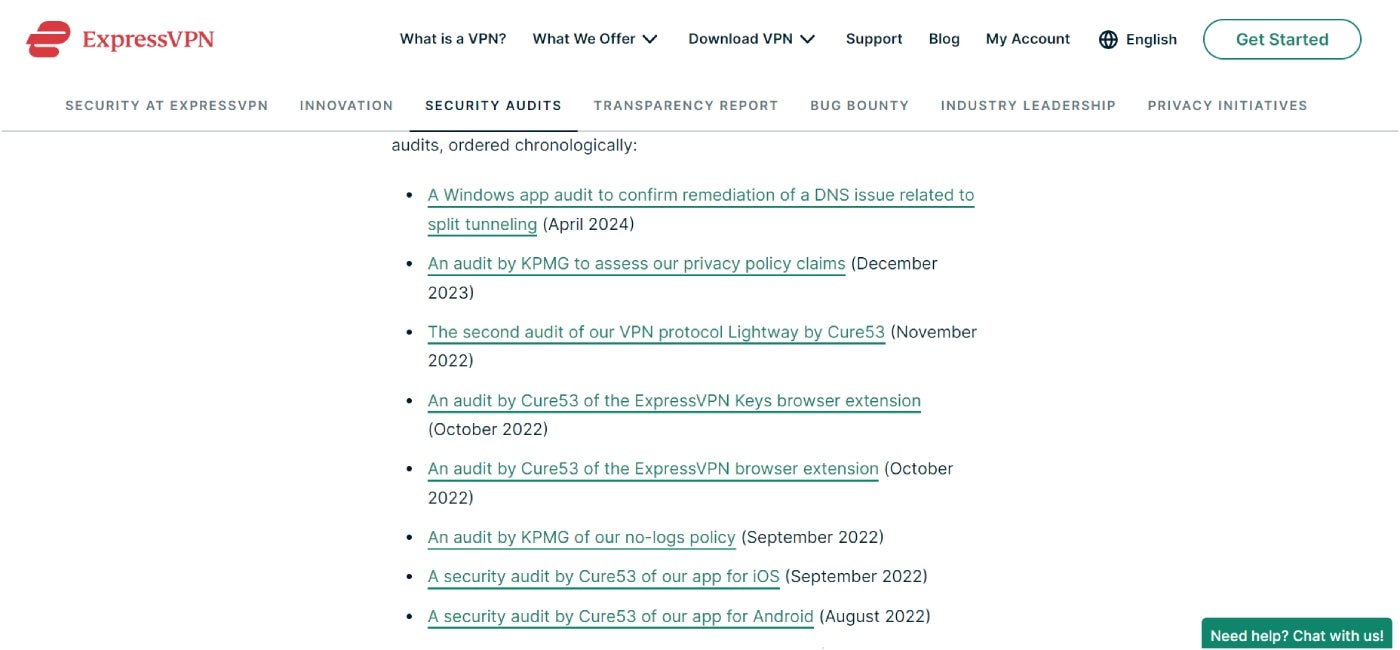
This isn’t to discount PIA VPN’s efforts on the audit side, as it has also undergone important third-party audits for its service. Its most recent audit was published in April 2024, where Deloitte reviewed PIA VPN’s server network and management systems. They also regularly publish Transparency Reports that contain details on court orders or data requests sent to its legal department.
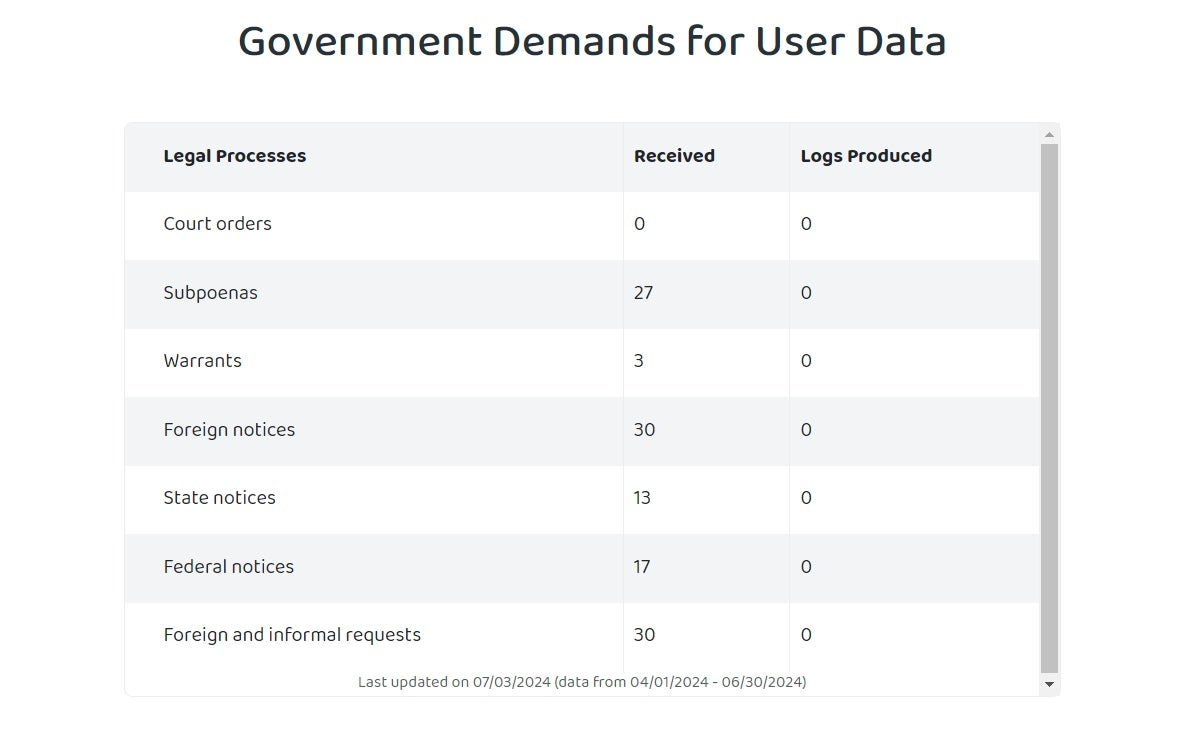
This means that regardless if you choose PIA VPN or ExpressVPN, you’re going to be using a secure and tested VPN. That being said, if we’re strictly talking about which provider has more audits, for a longer period of time, ExpressVPN is the better choice in this round.
Performance and speed
Winner: ExpressVPN
When it comes to speed and overall performance, ExpressVPN gets the slight edge over PIA VPN. Per my testing, ExpressVPN gave me more consistent speeds and a relatively smoother app experience.
To test both VPNs, I did my usual workflow as a writer of having multiple tabs open for research, using Google Workspace apps like Docs and Drive, attending online video meetings and streaming the occasional 4k YouTube video.
With ExpressVPN in particular, I got great speeds and reliability. There were zero noticeable drops in connection speed, and all the sites I visited loaded quickly. ExpressVPN also performed well in my speed testing. For downloads, it recorded a 25.57% decrease compared to my internet service provider, while for upload speeds, it garnered a 27.96% drop.
For me, a 30-40% drop in speed is where I would expect most VPNs to fall under, so ExpressVPN’s speed results are excellent.
On the other hand, PIA VPN also performed well in terms of speed. I had similar results in day-to-day use and generally enjoyed consistent speeds throughout using PIA VPN. For its speed tests, PIA VPN actually recorded a smaller decrease in download speeds at just a 17.1% drop. For uploads, it had a decent 32.8% decrease in speeds as well.
Where PIA VPN lags behind is in-app performance. During my time with PIA, I experienced a weird bug where I had trouble connecting to a server after switching to its WireGuard protocol. This was weird considering I didn’t encounter the same issue while using OpenVPN. Thankfully, the bug resolved itself after restarting the application twice.
In contrast, I had no such experience with ExpressVPN and found the app to run smoothly all throughout my time with it. While this could very well be a one-off bug, my testing showed that ExpressVPN will provide better overall performance than PIA VPN.
I also have to shout out ExpressVPN for its upload results. Most VPNs offer good speed test results for download speeds only. So, I find it impressive that ExpressVPN’s download and upload speeds performed similarly during my speed tests.
Standout security features
Winner: Private Internet Access VPN
While both VPNs have similar features on top of the main VPN, PIA looks to have a better set of additional security features. It includes advanced VPN-centric security features like network automation, which automatically connects you to the VPN after certain conditions are met; multi-hop functionality, which routes user traffic into two different servers; and obfuscated servers, which mask that you’re using a VPN.
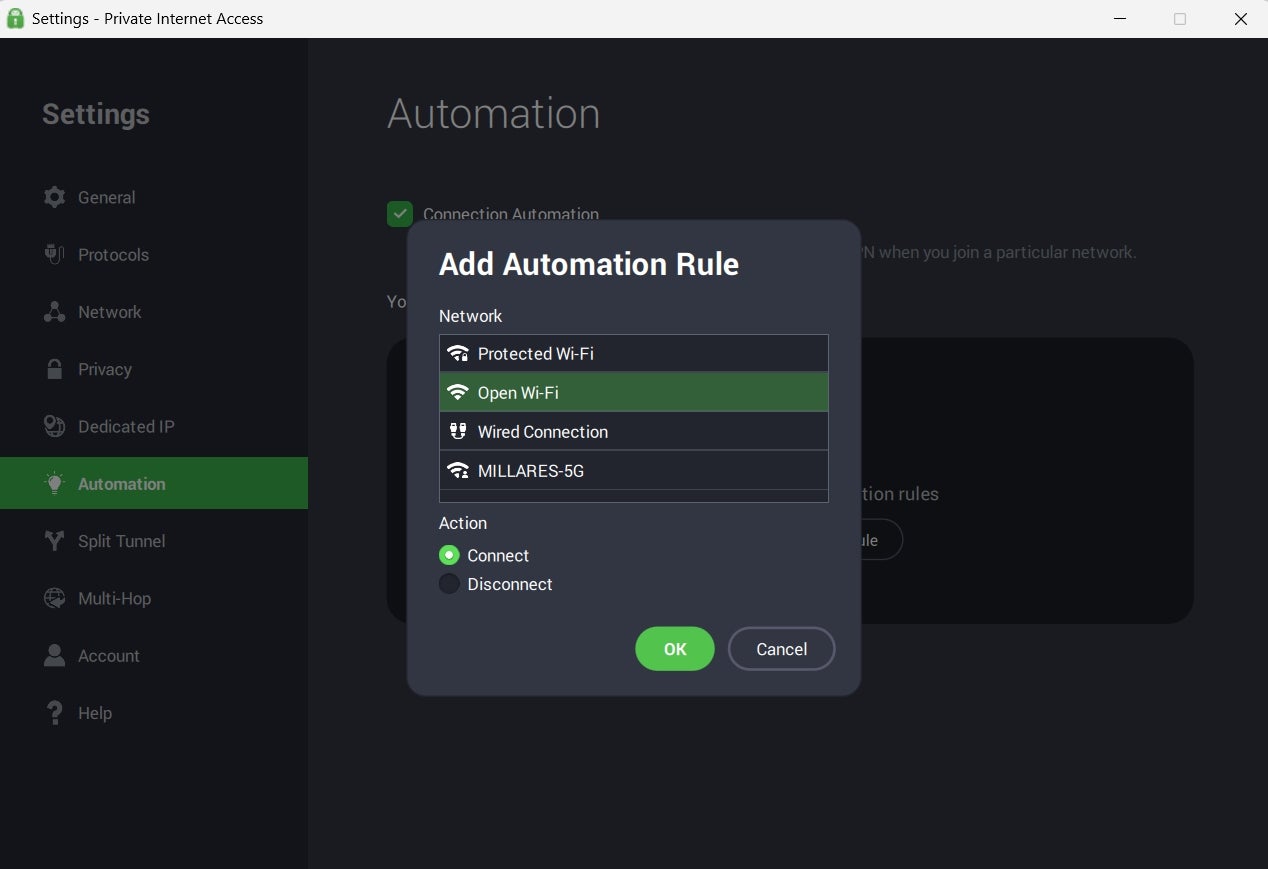
While not a feature per se, PIA VPN’s applications are also open source. This means that its source code is publicly available for review — a plus for businesses that value transparency and privacy in the software they use.
You also have the option to purchase PIA VPN’s antivirus and dedicated IP services as add-ons to your VPN subscription. While I would’ve liked either to be bundled in, it’s great that we have that option for users looking to have more security capabilities with the existing VPN plan.
On the flipside, a highlight of ExpressVPN’s security features is its TrustedServer RAM-only server technology, which ensures user data is wiped at every reboot and isn’t written on company hard drives. It also bundles in ExpressVPN Keys — its own dedicated password manager that’s included with any ExpressVPN subscription. This is a cool addition, especially if your business doesn’t have a password management solution yet.
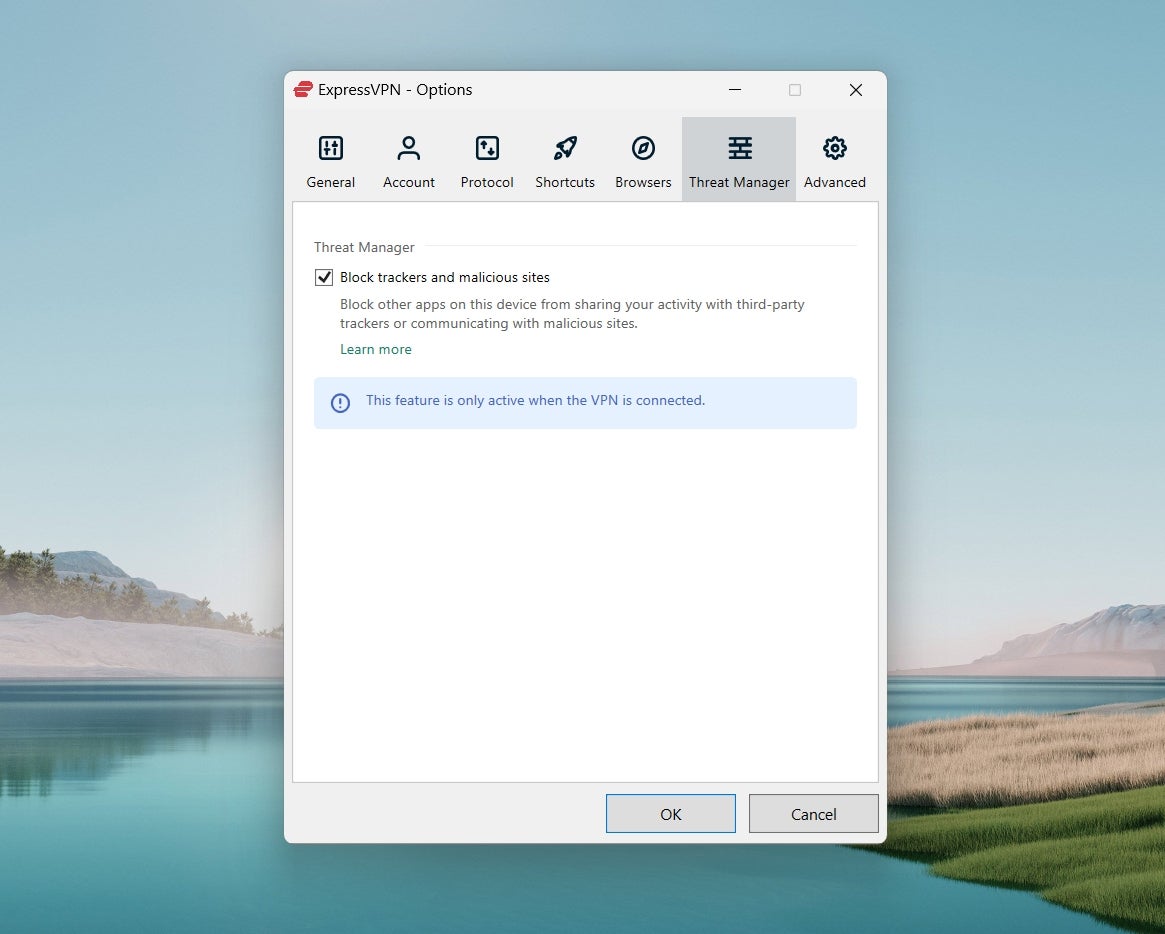
Both VPNs come with your standard VPN features, like split tunneling, kill switch and built-in ad/tracker/malware blockers. While having a dedicated password manager is enticing, I feel PIA VPN’s open-source software and VPN-focused features give it the advantage in this round.
Ease of use and design
Winner: ExpressVPN
ExpressVPN takes the cake when it comes to ease of use and design. Subjectively speaking, I feel ExpressVPN has the best balance of design and intuitiveness in a VPN application today.
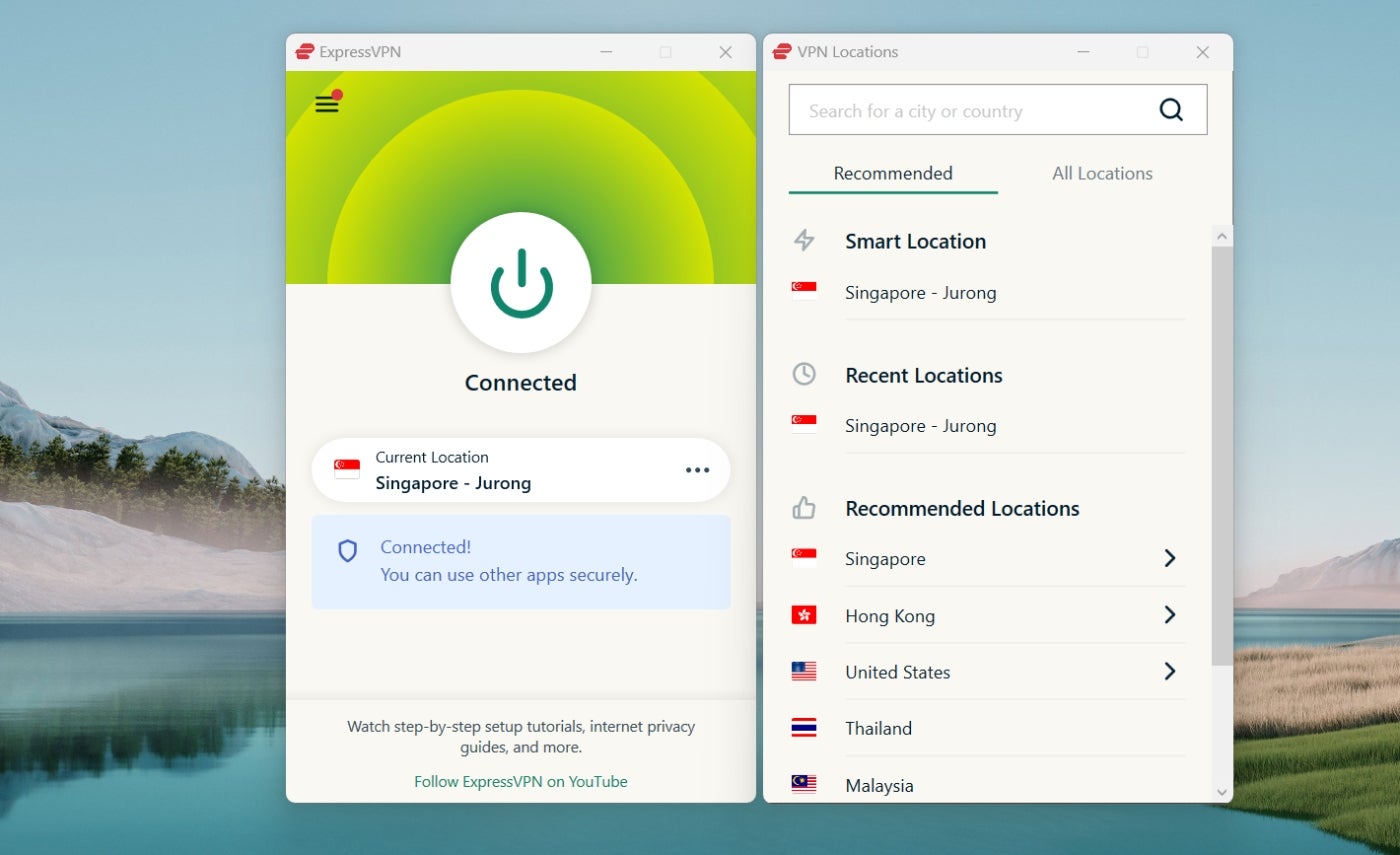
It has a big power button as your On/Off switch, a simple list where you can find your servers and a settings menu that’s neatly organized for easy access to features. The design also feels and looks modern without sacrificing overall functionality.
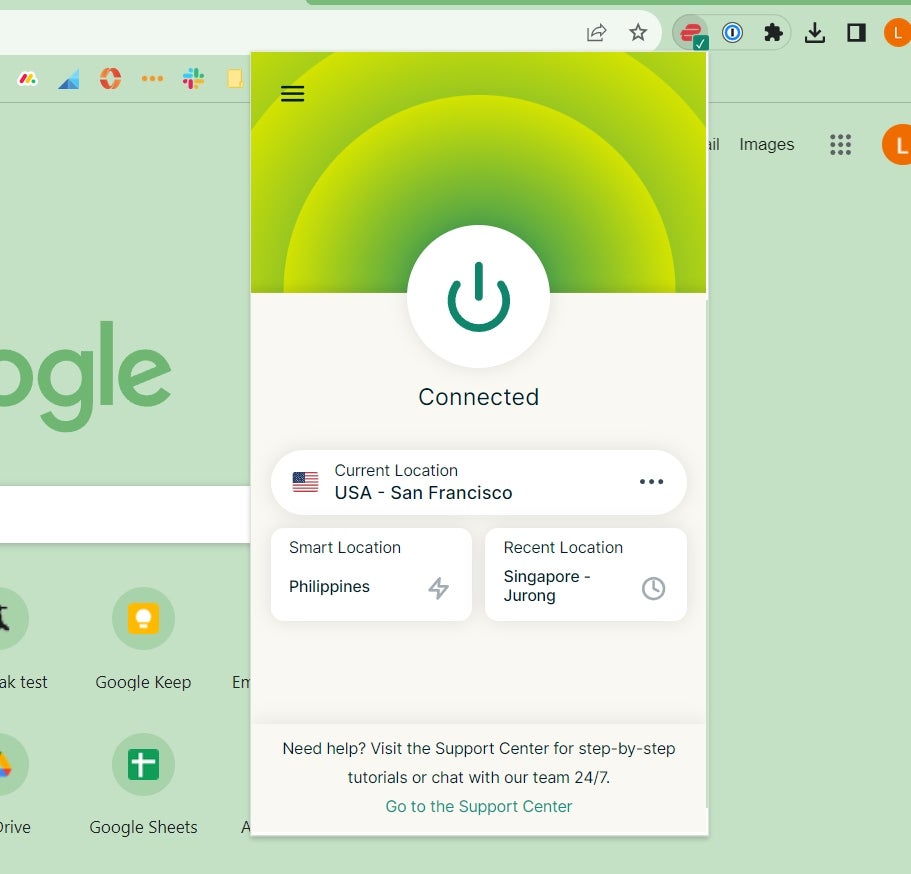
A personal highlight for me is how ExpressVPN’s browser extension acts as a remote control for the desktop app. This adds to the high level of polish and user-friendliness that ExpressVPN brings.
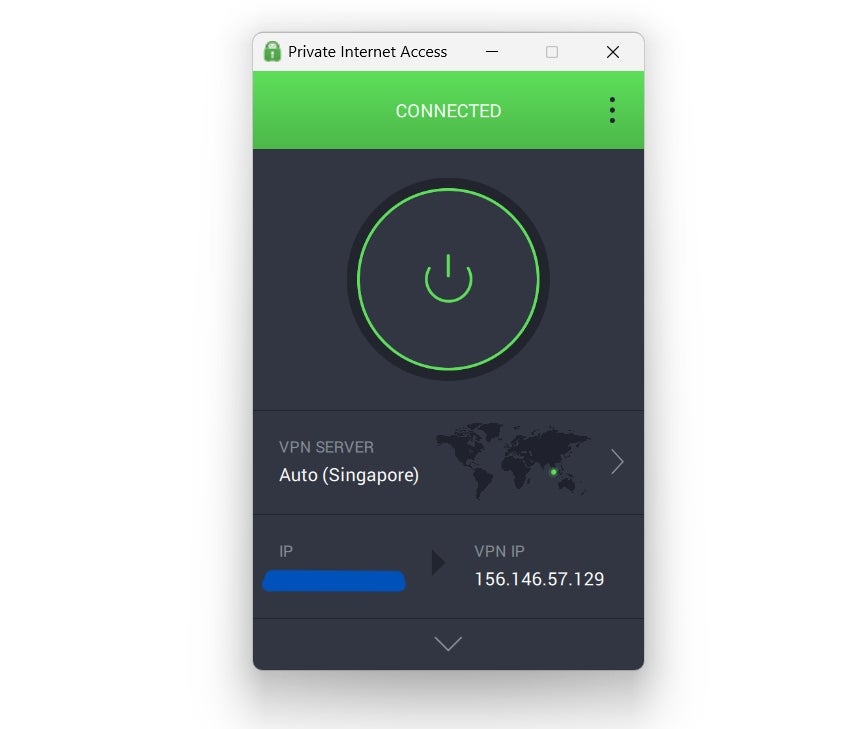
PIA VPN’s interface has its own merits as well. PIA VPN’s desktop and browser applications are customizable, enabling users to bookmark their most used VPN features at the top.
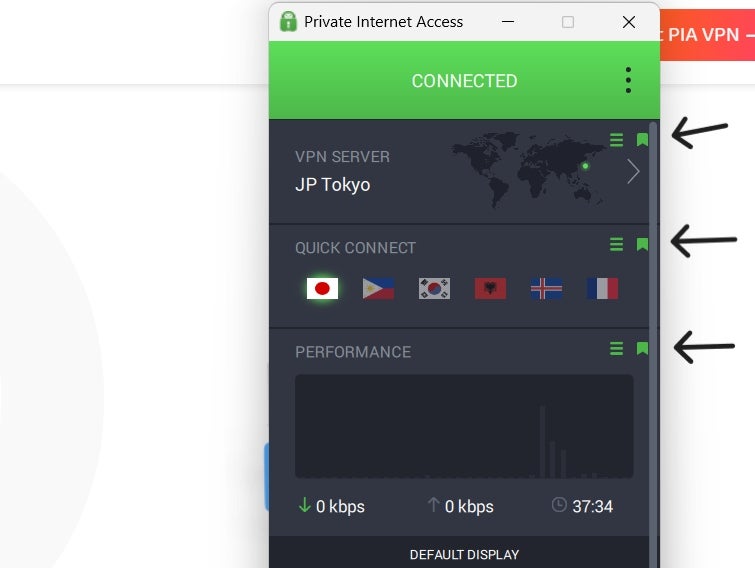
As a tinkerer, I appreciate PIA VPN giving users this type of control over their VPN experience. The app itself is also relatively easy to use and doesn’t have any glaring negatives from a design standpoint.
However, if we take both VPN apps side by side, it’s clear that ExpressVPN has a more polished and refined user interface than PIA VPN.
Simultaneous device connections
Winner: Private Internet Access VPN
One big advantage PIA VPN has over ExpressVPN is with simultaneous device connections, allowing for an unlimited number of devices compared to ExpressVPN’s maximum of eight devices connected at the same time.
This is important given that most businesses don’t want to spend an additional subscription to protect multiple devices. It certainly increases PIA VPN’s value proposition, considering it has a more affordable annual plan compared to ExpressVPN’s equivalent subscription.
I also find that unlimited simultaneous connections serve as a convenient set-and-forget feature since PIA users won’t have to worry about exceeding the maximum device limit when using the VPN.
Supported platforms
Winner: ExpressVPN
In terms of official platform support, ExpressVPN has a slight advantage over PIA VPN. ExpressVPN supports the main platforms such as Windows, macOS, Linux, iOS and Android.
If we look at browser support, ExpressVPN has official browser extensions for Google Chrome, Firefox, Microsoft Edge, Vivaldi, Chromium and Brave browsers. Sadly, there is currently no Safari support for ExpressVPN.
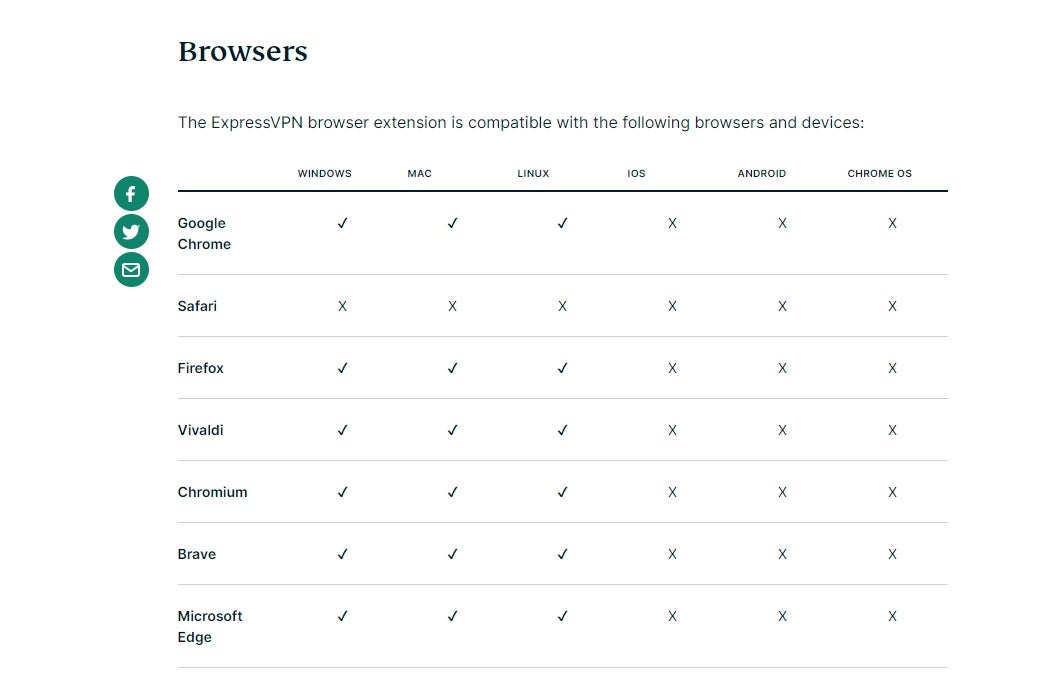
ExpressVPN also supports more niche platforms like Chromebooks, the Amazon Fire tablet, Amazon Fire Stick and Fire TV, Apple TV, Google TV and Android TV. You can also manually configure ExpressVPN for routers and media and gaming consoles like older generation Apple TVs, the Nintendo Switch, Xbox 360, Xbox One, Playstation 3, PS4 and PS5.
Meanwhile, PIA VPN supports a wide range of platforms in its own right, having official apps for Windows, macOS, Linux, Android and iOS. It also supports routers, Amazon Fire TV and Fire Stick, Android TVs, PS4, PS5, Xbox and the Nintendo Switch.
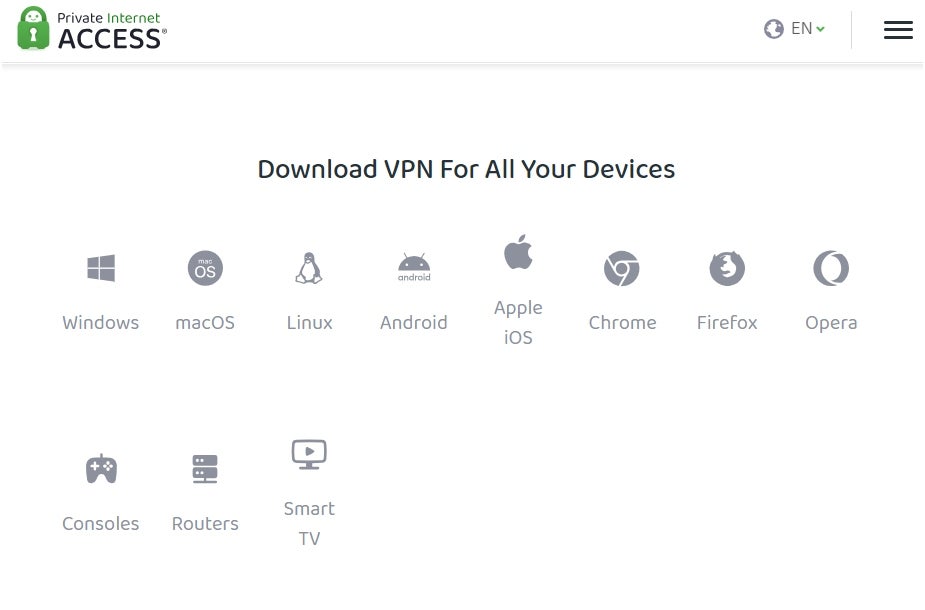
Official browser support is where PIA VPN loses out, as it only has apps for Chrome, Firefox and Opera at the moment. While support is more of a case-to-case aspect of VPNs, ExpressVPN has the slight advantage in terms of overall platform compatibility.
Value for money
Winner: Private Internet Access VPN
PIA VPN takes the value-for-money round, given its more affordable pricing across all its subscriptions. If we look at both VPN’s base annual plans, ExpressVPN’s $8.32 per month is more than twice the price of PIA VPN’s $3.33 per month subscription. After one year, that’s approximately $100 for ExpressVPN and just $40 for PIA VPN.
The pricing for both providers’ monthly plans is closer, at $11.95 per month for PIA and $12.95 per month for ExpressVPN.
I do find it weird that ExperssVPN’s longest-term subscription is for a one-year contract. Normally, VPN’s offer a two-year or three-year plan with lower monthly fees to entice users to opt in for longer, at a more affordable price. In this case, only PIA has that type of plan with its three-year subscription at $2.03 per month, or just above $24 per year.
While ExpressVPN looks to justify this higher price tag with its more refined application and larger server network, PIA VPN’s significantly more affordable pricing is a meaningful advantage.
Finally, the kicker is the value you get with PIA VPN’s unlimited simultaneous device connections. At $3.33 per month, you get to connect all laptops, smartphones and other devices to a PIA VPN server without worrying about exceeding a maximum device limit.
Private Internet Access VPN pros and cons
Pros
- Unlimited simultaneous device connections.
- Customizable VPN application.
- 7-day free trial via mobile; no payment info required.
Cons
- WireGuard protocol can be buggy at times.
- No free version.
ExpressVPN pros and cons
Pros
- Refined and polished user experience.
- Server network across 105 countries.
- Consistent and reliable VPN speeds.
Cons
- Expensive annual plan.
- Only allows up to 8 simultaneous device connections.
- Lacks more affordable, long term subscription.
Should your organization use Private Internet Access VPN or ExpressVPN?
After an intense match-up, ExpressVPN comes out as our winner in this comparison. With its wide 105-country server network, reliable and fast VPN speeds and polished desktop experience, I’m confident most businesses or users that choose ExpressVPN will be happy customers.
Add to that its strong portfolio of independent audits and extensive support for multiple operating systems, and you get a high-quality VPN solution that’s worth the price.
ExpressVPN is best for small-to-medium sized businesses that want a no-nonsense VPN experience with an easy-to-use interface and reliable performance.
This isn’t to say that PIA VPN isn’t a good option — quite the contrary. I believe PIA VPN provides really good value with its solid 91-country server fleet, customizable application and open-source software.
PIA VPN is best for startups, small teams and budget-conscious users that want a bang-for-buck VPN that can cover multiple devices while still offering fast VPN speeds.
Methodology
My comparison of Private Internet Access VPN and ExpressVPN involved an in-depth assessment of both VPNs’ included features, overall value and real-world performance.
To assess each VPN, both PIA VPN and ExpressVPN were scored on everything from their server networks to pricing. In particular, I looked at five main pillars for evaluation, each having corresponding weights:
- Pricing (20%).
- Core VPN features (30%).
- Ease of use (15%).
- Customer support (30%).
- Expert analysis (5%).
If you want more details, you can check out our full VPN Review Methodology.
In addition, I also analyzed real user feedback to round out my final recommendations for both Private Internet Access VPN and ExpressVPN.
For speed and performance, I tested both VPNs on my personal Windows laptop and ran them through Ookla’s public Speedtest. Lastly, I also considered which types of businesses or users would best benefit from either Private Internet Access VPN or ExpressVPN.

